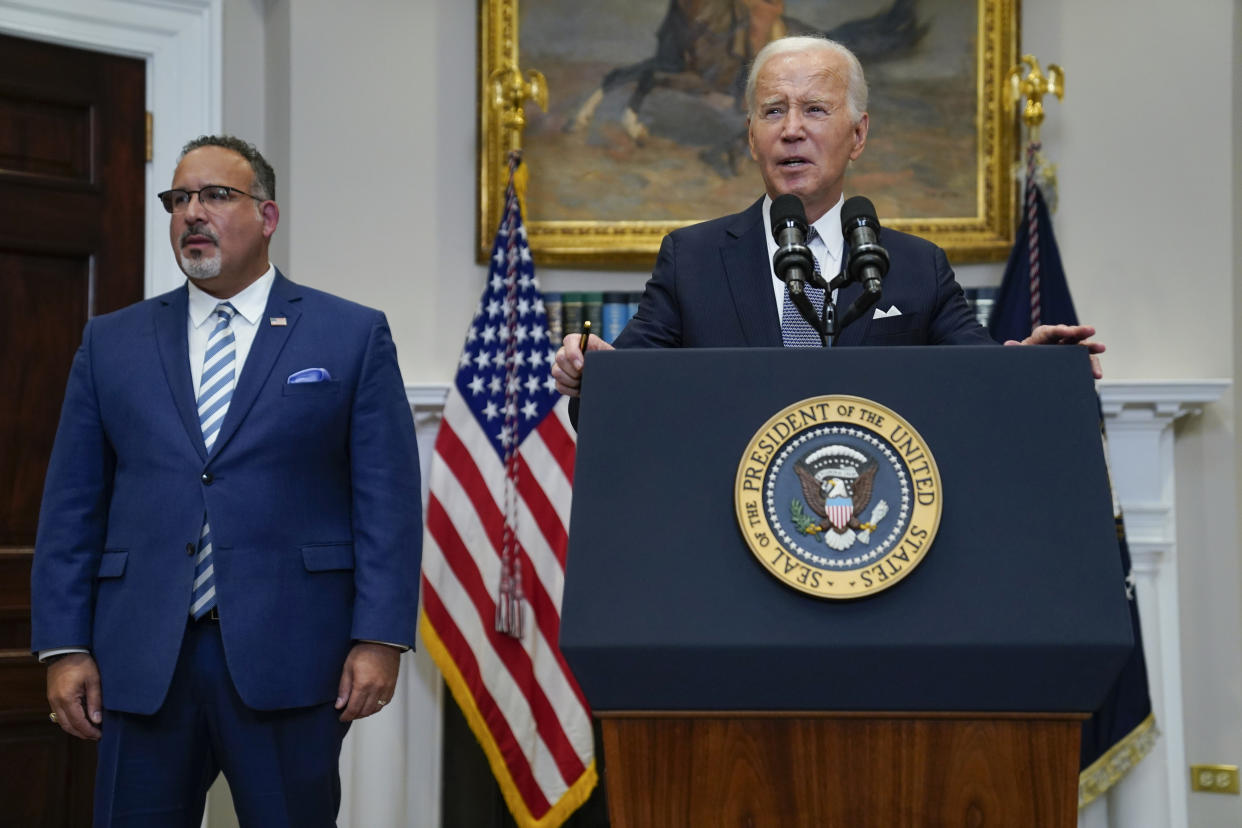Biden’s efforts to assist transgender students are unraveling

- Oops!Something went wrong.Please try again later.
Schools are agonizing over how to implement one of President Joe Biden's top civil rights priorities after a tangle of court orders created a baffling patchwork just weeks before students return to campus.
The regulation, which takes effect on Thursday, updates a federal anti-discrimination law to bolster protections for transgender and pregnant students. But nearly half of the states don’t need to abide by the new rule due to legal holdups and many others aren’t sure how to — especially since the policy’s fate is unclear.
The Education Department has offered only broad guidance, leaving administrators worried about how to handle sexual misconduct claims and vulnerable students — such as transgender teens — wondering if schools can ensure their safety.
“A lot of schools are feeling betrayed,” said Brett Sokolow, chair of the Association of Title IX Administrators, which supports schools with the policy. “Here's the Department of Education saying you must use this rule, we've vetted it and it's perfectly legal. And then it turns out, a lot of judges don't think it is and the schools are like, ‘We’re caught in the middle.’”
Biden’s changes, which amend the federal law known as Title IX, overhaul former Education Secretary Betsy DeVos’ rule that mandates how schools respond to sexual misconduct. It could prove one of Biden’s defining policies as he seeks to cement his legacy. Administration officials have touted the new rule as the “most comprehensive coverage” students will receive in more than a half-century of Title IX.
The Education Department did not respond to a request for comment.
Biden’s changes drew praise from civil rights advocates and LGBTQ+ groups, but prompted lawsuits from Republican state attorneys general and conservative organizations. They argue the new rule weakens the rights of students accused of misconduct and fails to protect sex-separated programs and spaces, such as locker rooms.
“The Biden-Harris Title IX rule was built to appease the demands of their radical, woke political base,” DeVos told POLITICO in a statement. “The real losers here are students and schools, who are once again caught in the middle of a senseless political game — particularly women and girls, who are seeing Title IX used to take rights away from them.”
The Biden administration, in an effort to ensure the rule goes into effect, has asked the Supreme Court to let the Education Department enforce it without provisions that safeguard protections for gender identity, since that’s the primary focus of the legal fights. The high court could make a decision as soon as this week.
Conservative advocates are calling on the Education Department to postpone its enforcement efforts until the courts figure it out.
“It will be a nightmare for the department to enforce this regulation,” said Bob Eitel, former senior counselor to DeVos and co-founder of the Defense of Freedom Institute, a conservative nonprofit that is suing over the rule. “They need to consider the fact that they've written an illegal rule without basis in law, and they need to withdraw it.”
But the agency says it will proceed. Officials sent out guidance last week that instructed schools how to draft new nondiscrimination policies and it will hold a webinar on Thursday to answer questions.
Advocates of the changes say the guidance isn’t specific enough and are hoping for more state-by-state clarity. How, some ask, does a school district proceed if enforcement at a single school is blocked? What happens if the rule changes in the middle of a sexual assault investigation?
“Students are left feeling really confused and also disheartened to start yet another school year without new Title IX rules that are going to really clarify and solidify their rights,” said Emma Grasso Levine, Title IX policy and program manager at Know Your IX, a youth-led advocacy group that informs students of their rights under the law.
The changes make good on Biden’s 2020 campaign promise to unravel much of the DeVos rule, a defining policy of her tenure. Supporters of the new rule argue the previous one created a burdensome investigation process for students. They say schools were able to ignore some reports of sexual harassment because the standards for discrimination were too high.
“There were a lot of lawsuits filed claiming either reverse discrimination under Title IX or due process violations and I think that has scared schools in some cases from responding to sexual harassment complaints with the seriousness that they deserve,” said Shiwali Patel, senior director of safe and inclusive schools at the National Women’s Law Center.
While similar lawsuits challenging protections for transgender students are likely, Patel said, many states have laws to protect them. And some schools must comply with previous circuit court rulings such as one that requires Virginia and West Virginia schools to allow transgender students to use the bathroom that aligns with their gender identity.
About 400 members of the Title IX association attended its town hall last week to discuss the uncertainty. They’re encouraging schools to prepare contingency plans in case they have to flip to one rule or another.
“The field is unsettled right now, said Sokolow, chair of the Title IX group. “I would say there's a lot of frustration and a little bit of panic.”

